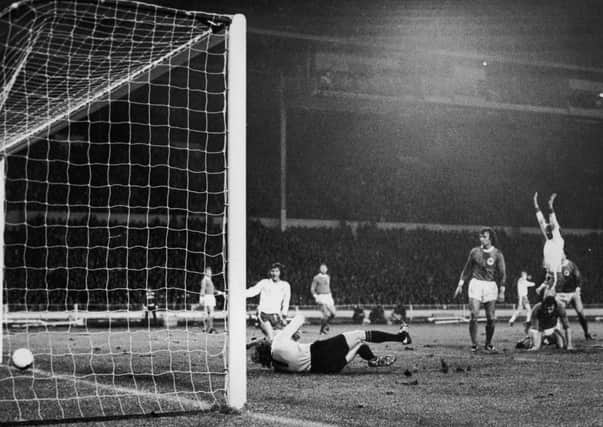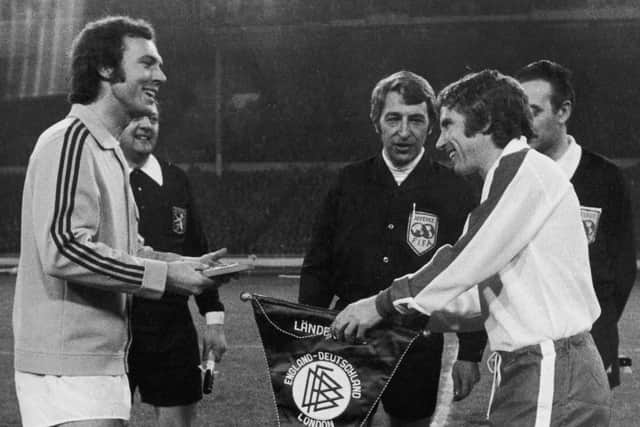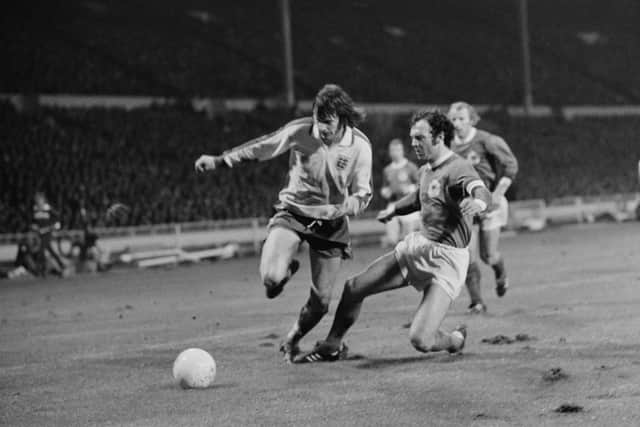England due a precious victory in Germany’s second home of Wembley


Notwithstanding that feted and much-discussed July afternoon in 1966, the home of football has been benevolent to first West Germany and then the unified nation – with just one loss being registered in their nine meetings in England since.
Following reunification in 1990, Die Mannschaft have not been beaten in six visits in a nation viewed as the motherland of football by all Germans.
Advertisement
Hide AdAdvertisement
Hide AdTheir sole defeat since the World Cup final came in March, 1975 in the hundredth international at Wembley.


It was a noteworthy day for then England manager and former Leeds United chief Don Revie, who watched his side triumph 2-0 in a friendly game against the West Germans.
In his time in charge of the nation, it represented one of the few bonafide high points.
England have not won in seven games since on home soil. There may have been victories against German sides in Mexico City – in the Azteca 2000 tournament in 1985 – Charleroi, Munich and Berlin, but the London landscape has been barren.
Advertisement
Hide AdAdvertisement
Hide AdThe Germans, of course, signed off with victory in the final game at the old Wembley Stadium in October, 2000 and, somewhat unsurprisingly, became the first international visiting side to triumph at the new-look venue just under seven years later in August, 2007.


This particular fixture in the capital has brought other unwelcome milestones along the way and has been the final game in charge for two England managers, for differing reasons.
A sign of things to come arrived in the Spring of 1972.
An emerging West German side blessed with the midfield swagger of Gunter Netzer and the deadly marksmanship of ‘Der Bomber’ Gerd Muller eased past an ageing England team 3-1 in a one-sided European Championship first leg.
Against a home side who possessed just one player under the age of 26, the West Germans – wearing an iconic green away kit – outclassed England, with a young Uli Hoeness scoring alongside Netzer and Muller.
Advertisement
Hide AdAdvertisement
Hide AdHelmut Schon’s side were not just European champions but World Cup holders on the next previously mentioned occasion when they came to London just under three years later.
A side containing legends in Franz Beckenbauer, Berti Vogts, Sepp Maier and Rainer Bonhof lost 2-0 to Revie’s England in just his third match in charge.
Ably led by new captain Alan Ball, England prevailed thanks to strikes from arguably the best all-round English-born midfielder in the country at the time in the incomparable Colin Bell – at the height of his powers before a serious knee injury in a Manchester derby later that year – and another player with pace and drive in Malcolm MacDonald, who scored his first goal for his country.
All was seemingly set fair for England, who handed debuts at full-back to Leicester City’s Steve Whitworth and QPR’s Ian Gillard, with Revie’s side keeping their third successive clean sheet.
Advertisement
Hide AdAdvertisement
Hide AdAs far as England versus the non-Eastern bloc Germany is concerned on home soil post ’66, that occasion very much represents an oasis in a desert.
The nations reconvened in October, 1982 in Bobby Robson’s first match in charge at Wembley, with the visitors winning 2-1.
Robson’s last major competitive game in Turin in that famous World Cup summer of 1990 almost eight years later would also go the way of the West Germans, in much more painful circumstances.
Back in the autumn of ’82, England were downed by a brace from a stellar German name in Karl-Heinz Rummenigge.
Advertisement
Hide AdAdvertisement
Hide AdSubstitute Tony Woodcock, who had recently returned home to Arsenal following a spell in the Bundesliga with Cologne, replied for Robson’s side.
Graham Taylor was the face in the dug-out when the Germans arrived in September, 1991, their first game on the hallowed turf as a unified nation.
After a run of 12 unbeaten games, Taylor sampled his first defeat with a side containing debutants in Paul Stewart and Paul Merson spurning opportunities against a rival who are never so wasteful.
Karl-Heinz Riedle, later to play for Liverpool and Fulham, netted the only goal of the game and it was a case of unlucky 13 for Taylor and another England loss.
Advertisement
Hide AdAdvertisement
Hide AdThe next meeting – again settled by the heartbreaking route of penalties like Italia 90 in another epic semi-final – is one that no-one of an English persuasion can forget. Not least Gareth Southgate.
Barry Davies’s cry of ‘Oh no’ when Southgate missed his spot-kick spoke for a nation. Once again, Davies hit the right tone. No further words were required.
It was a night which started with Alan Shearer’s trademark one-handed salute after scoring and David Baddiel and Frank Skinner signing in the stands ahead of Paul Gascoigne’s pained expression after stretching every sinew but just failing to connect to score a winner in extra-time.
Then there was more and a familiar story as German fans brazenly sang ‘Football’s coming home’ at the game’s conclusion as Terry Venables said goodbye.
Advertisement
Hide AdAdvertisement
Hide AdEngland left home in late 2000 and decamped to the regions, but not before a low free-kick from Dieter Hamman slid under Rotherham-born David Seaman in the hosts’ farewell to the twin towers of Wembley ahead of extensive renovation.
A famous figure born just up the road from Seaman in Kevin Keegan decided enough was enough after his England side lost in a key World Cup qualifier.
The Doncastrian, who walked off in the rain to a cascade of boos from fans, announced his resignation in the home dressing room after deciding he lacked the tactical wherewithal for international management.
It was a striking moment, but typical of Keegan, who always did things his way in his career and took control of his own destiny. It is an admirable quality.
Advertisement
Hide AdAdvertisement
Hide AdThe personnel may change and even the appearance of the ground. But there were few surprises when Germany – courtesy of strikes from Kevin Kuranyi and a debut goal from Christian Pander – won 2-1 and became the first away team to win at the new Wembley in a friendly victory in 2007.
A goal from Per Mertesacker saw Germany predictably win 1-0 in the Football Association’s 150th final celebration match in March, 2013, while the two nations played out a 0-0 draw on their last meeting in November, 2017 – on a night when both were seriously under-strength.
Given the overwhelming majority of the above, to say that England are due a precious home victory over Germany is the understatement of the decade, let alone year. Try over four-and-a-half decades. Maybe this time...